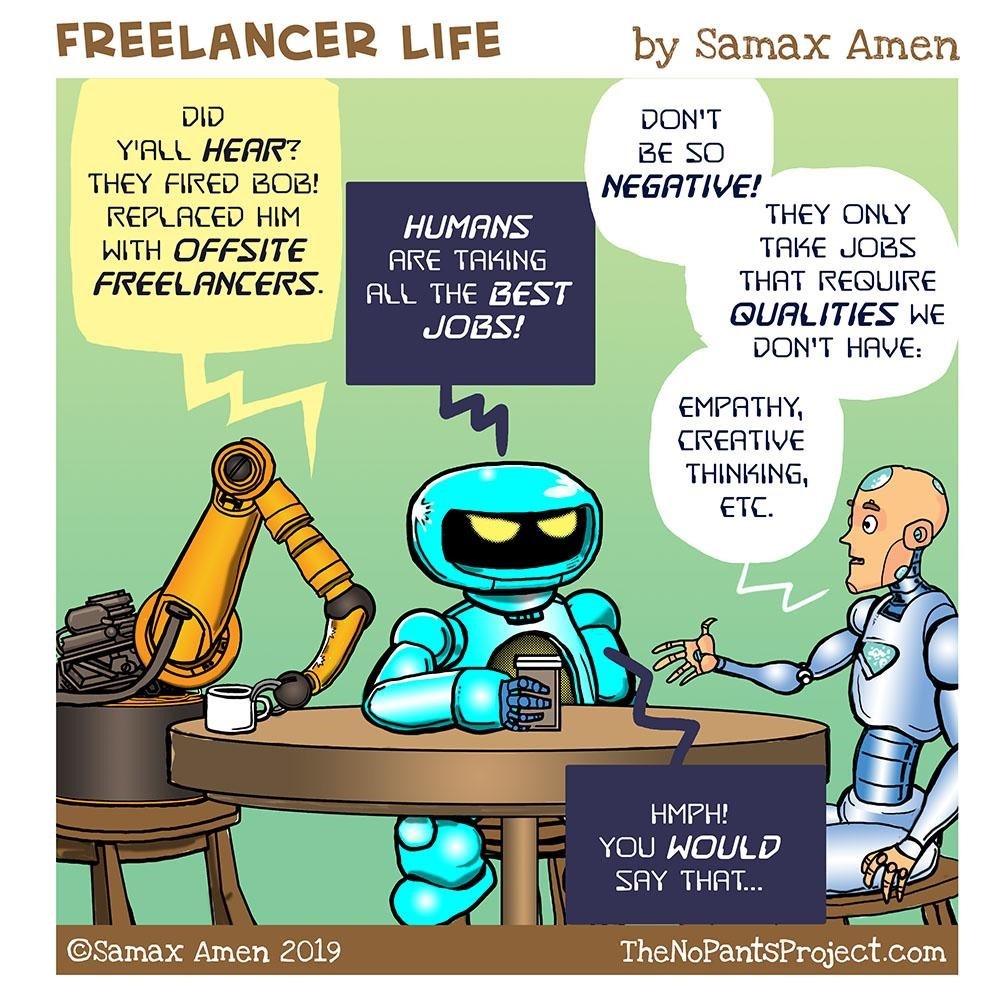Do you worry that robots are going to take your job?
Many of the best sci-fi movies you’ve ever seen involve the fear of robots taking over.
Sometimes it’s computer programs of our own design evolving and supplanting us faster than we can control them.
Other times, aliens arrive from outer space or other dimensions, empowered with superior artificially intelligent technology so advanced that our defenses are not prepared to stop them.
Sometimes technologies we design to enhance our abilities threaten to strip us of our humanity from the inside.
In these fictional tales, robots think faster than we can hope to. They don’t need to sleep. They don’t get bored. They never succumb to fear, or apathy, or pain.
So it’s natural to be concerned about the impact automation has on wages and the availability of jobs. In fact a whopping 80% of retail jobs are at risk to be lost to robots in the next two decades.
“Retail is one industry in which employment is likely to vanish, as it has done in manufacturing, mining and agriculture,” says Dr. Carl Frey, Co-Director of the Oxford Martin Programme on Technology and Employment.
But it’s not just retail.
Dr. Frey and Michael A. Osborne’s 2013 report THE FUTURE OF EMPLOYMENT: HOW SUSCEPTIBLE ARE JOBS TO COMPUTERISATION? estimates that “47 percent of total U.S. employment is in the high risk category, meaning that associated occupations are potentially automatable…” within “perhaps a decade or two.”
Tesla CEO Elon Musk has claimed that he will launch a fleet of 1 million Robotaxis in 2020, putting rideshare companies like Uber and Lyft out of business. Musk’s Robotaxi claims are being hotly disputed as I type this, but even his critics are putting the era of the driverless car within Frey and Osborne’s decade or two window.
Whenever it happens, driverless vehicles would have serious implications for anyone working in transportation or logistics.
Australian company Fastbrick Robotics is developing a robot called Hadrian X that can lay all the brick for an entire house in three days or less. This is the future of construction.
“If we could flick a switch to 2023,” says Fastbrick CEO Mike Pivac, “you’d see machines working in concert together.”
According to this report by Mckinsey, the global construction industry employs 7 percent of the world’s working-age population, most of whom would be displaced by the technologies companies like Fastbrick are developing.
The examples go on and on.
These days, everyone is asking “will robots will take MY job?” But we don’t need to give in to fear. Instead, let’s counter fear with facts and action.
With all the cautionary stories we generate and consume about robots, we can be forgiven for assuming that machines are better than humans at everything. That we are just soft, teary-eyed insects waiting to be crushed under the metaphorical robot heel of automation.
In reality, your humanity (properly positioned) is your superpower!

Today you are going to learn to use your unique human abilities to make yourself indispensable.
While others are trying to beat robots at being robots, or feeling entitled to their income (setting themselves up to be caught unprepared), you will start to undo the cultural brainwashing that makes you feel hopelessly vulnerable to the impending robot-powered armageddon.
Technology has been replacing the need for human effort since the invention of the wheel. With a little foresight and discipline, you can easily avoid being negatively impacted by automation.
In fact, you can learn to use it to your own advantage!
Don’t Try to Beat a Robot at Being a Robot.
In the industrial era of capitalism, an education system was designed and implemented to train citizens to be compliant factory workers.
We were encouraged to show up, receive instructions, and do what we’re told. In exchange for obedience and hard work, we could reasonably expect a living wage.
It was great.
This golden age of industrial era-style work (where one could expect to be paid a middle class wage to do unremarkable work) is over in the United States.
Robots can show up and comply better than you or I ever could or ever would.
So What’s The Solution?
In a conversation about how to update western educational systems for the post-industrial age, marketing thought leader and author Seth Godin identified two things robots can’t do:
“If you know how to lead, and you know how to solve interesting problems, you will always be able to find a job, create value, and you will never get bored.”
He continues to say:
“Top down, we are pushing people to do ever more menial labor, and bottom up we are pushing computers to do that same job.”

In a hilarious and informative episode of the cable news satire Last Week Tonight with John Oliver (please don’t get sucked into watching John Oliver on YouTube for 2 hours like I did), the show seeks to tackle the probable nuanced effects of automation on the future job market.
In the final segment, Oliver advises children who are trying to answer the age old question, “what do you want to be when you grow up?”
The catch is that they must try to think of jobs that will not be overtaken by robots, which they find to be comically challenging. After a couple minutes of smashing their dreams, Oliver is asked what jobs are there that robots can’t do.
With a straight face, he says, “a series of non-routine tasks that require social intelligence, complex critical thinking, and creative problem solving.”
If you see robots angling for your skillset, you need to work on:
- Leadership Skills. You can’t show up to clients asking for a to-do list forever. Educate yourself on all the processes, principles, and strategies that go into what you’re doing. Understand how your role fits into the overall picture of your client’s business, until you are able to offer insight to the client.
- Creative Problem Solving. Competency is no defense against robots. You need to aim for mastery. You need to understand the space you’re in well enough to be able to solve tough problems for your clients.
- Social Intelligence. Your Social Intelligence is your capacity to know yourself and others. It allows you to react appropriately to be successful in social situations. Daniel Goleman popularized the hard value and career consequence of humans’ so-called soft skills in his groundbreaking books Emotional Intelligence and Social Intelligence. He identified in his research that Emotional and Social Intelligence competencies were ⅔ more predictive of who would become outstanding performers than IQ.
Let Go of Entitlement and Embrace Responsibility.
All during my twenties and early thirties, I struggled with entitlement. I believed that if I was willing to show up and do what I was told, I should be paid a living wage.
To be honest, I still like that idea.
But no one is out there making sure that things that “should” happen do happen. That’s just not how the world works.
If you want money, you have to understand how money works.
In episode 4 of The No Pants Show, Mike Shreeve, the Head Troublemaker of The No Pants Project, sums it up like this:
“People pay for what they value.”
“In other words, a very simple measurement. If you do not have enough of the monies, if you do not have enough little tickets that represent bartering, it is because you are not offering something that people value to trade.”
The No Pants Project freelancing philosophy teaches you to get away from commoditization: the positioning of your service as interchangeable with everyone else in your niche.
Seth Godin said it this way on his blog:
“If the boss can write [what you do at work] down, she can find someone cheaper than you to do the work.
Probably a robot.”
“Robot” is an old czechoslovakian word that means “servitude” which in turn comes from “slave.”
Believe it or not, the word was coined as a name for a race of artificial humanoid beings created to serve humans in a proto-sci-fi stage play called Rossum’s Universal Robots which debuted in 1921.
SPOILER ALERT- The robots rise up and massacre the human race at the end.
So we see that robots have always been the ultimate employees. They give maximum effort and a consistent result every time. You are not gonna win competing with a robot when it comes to menial tasks.
But that’s cool. You’re not an employee. You’re a freelance business.
Empathy Is Good for Business.
Be present in your business, and be human in your business interactions. Brands and business entities are great, but people actually like to interact with and do business with other people.
And when there is a conflict, don’t hide behind policies, scripts and transactions. Showing empathy in these encounters doesn’t mean giving people what they want.
Help whenever you can, and even when you can’t help, make sure your customers feel heard.
I can’t stress this enough: Empathy is one the core principles of successful freelancing.
If You Can’t Beat ‘em, BUY ‘EM!
Yes, getting your superhuman potential humming on all cylinders so you can protect yourself from obsolescence is a lot of work! You know what can help make your job easier?
ROBOTS! There’s no rule that says you can’t get the mighty robot army working for your superhuman business, the way their czech creators intended.
So here’s 4 EXAMPLES of How You Can Harness the Power of Robots (Automation) in Your Business!
- Start a Podcast. Years ago,I was invited onto an internet radio show to talk about nerd stuff (because I’m a nerd). The response was great! People kept suggesting that I should get my own radio show. My ego loved the flattery, but the amount of work, and help that I would need was daunting. These days, all you need is a cell phone and some free apps. Literally.
- Use Autoresponders. Think of an autoresponder as a tour guide/sales rep that delivers a prearranged sequence of emails to educate, sell products, or whatever, as needed.
- Set Up A Client Getting Faucet. No matter what your business model, you need clients. The Client Getting Faucet method makes it easy to get them when you want them, and you can turn it on and off as needed.
- Advertise on Facebook. Get the Facebook robots working for you. I learned a cool and relatively cheap ad strategy called Omnipresence that works to keep me in front of my people on Facebook, so I don’t have to be on there chasing organic traffic all the time. Here’s a sweet explanation of how it works.
LET’S RECAP!
Don’t try to beat a robot at being a robot! They are so much better at menial tasks, and getting better all the time, so ditch those jobs and go be a human!
Instead of being an inferior robot, work on:
- Leadership Skills
- Creative Problem Solving
- Social Intelligence
Ditch Entitled Thinking. Provide more value to earn more!
Be Present. Don’t hide behind your business machine!
Show Empathy. It’s great for business!
Get The Power of Automation Working for You. Use tools like an email autoresponder or Facebook ads to help you get things done.
The No Pants Project offers access to top notch coaching, powerful tools to build your own 90-day plan to achieve a full-time, profitable freelance business that allows you to offer professional-grade value by unlocking your unique superhuman powers. Check it out here to see if it’s right for you.













